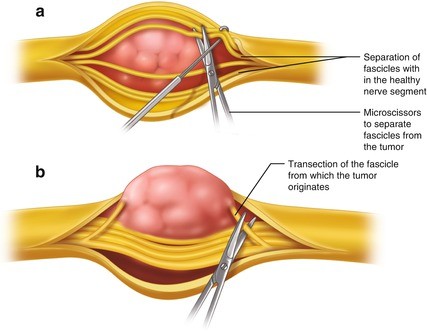Nerve tumors

Nerve tumors
Contact Us
Related Videos :
Frequently Asked Questions :
Q1: Are all nerve tumors cancerous?
No, most nerve tumors are benign, meaning they are non-cancerous. However, a small percentage can become malignant.
Q2: What are the chances of nerve tumors recurring after treatment?
The recurrence depends on the tumor type and the success of the initial treatment. Benign tumors, once removed, have a low recurrence rate, while malignant tumors may require additional treatment.
Q3: How soon can I return to normal activities after nerve tumor surgery?
Recovery times vary depending on the extent of the surgery. Many patients can resume light activities within a few weeks, but full recovery may take several months.

About Nerve Tumors
Nerve tumors, also known as peripheral nerve sheath tumors, are abnormal growths that develop on or around nerves. These tumors can either be benign (non-cancerous) or malignant (cancerous). Nerve tumors often cause discomfort, pain, or even neurological symptoms, depending on their location and size. Early diagnosis and treatment can prevent complications and improve the patient’s quality of life.
Dr. Sandeep Vaishya, a leading neurosurgeon with extensive experience in treating nerve tumors, offers expert care and advanced treatment options tailored to individual needs.
Causes of Nerve Tumors
The exact causes of nerve tumors are not always clear, but several factors may increase the risk:
- Genetic disorders: Conditions like Neurofibromatosis type 1 (NF1) or Schwannomatosis increase the likelihood of nerve tumors.
- Radiation exposure: Prior exposure to radiation therapy can lead to the development of nerve tumors.
- Injuries: Trauma to the nerves or surrounding tissue can potentially contribute to tumor growth.
- Hereditary factors: Family history of nerve tumors or genetic mutations may predispose individuals to these growths.
Types of Nerve Tumors
Nerve tumors come in various types, each with distinct characteristics:
- Schwannomas: The most common type, arising from Schwann cells, which insulate nerves.
- Neurofibromas: Typically associated with Neurofibromatosis, these tumors can affect multiple nerves.
- Malignant Peripheral Nerve Sheath Tumors (MPNST): These are rare, cancerous tumors that require prompt and aggressive treatment.
- Ganglioneuromas: Benign tumors that affect the peripheral nervous system, often found in children and young adults.
Symptoms of Nerve Tumors
The symptoms of nerve tumors vary depending on the location and size of the tumor. Common signs include:
- Pain or discomfort: Localized pain near the tumor or along the nerve pathway.
- Numbness or tingling: Loss of sensation or tingling in the affected area.
- Weakness: Difficulty moving the affected limb or muscle weakness.
- Lump or mass: Visible or palpable swelling in the affected area.
- Balance and coordination issues: Particularly if the tumor is in the spine or brain region.
If you experience any of these symptoms, it’s important to consult a specialist like Dr. Sandeep Vaishya for an accurate diagnosis.
Diagnosis of Nerve Tumors
Diagnosing nerve tumors involves a combination of advanced imaging and clinical evaluation:
- MRI (Magnetic Resonance Imaging): This is the preferred imaging technique for detecting and visualizing nerve tumors.
- CT Scan (Computed Tomography): May be used in some cases to further evaluate the tumor’s size and location.
- Biopsy: In certain cases, a tissue sample may be taken to determine whether the tumor is benign or malignant.
- Electromyography (EMG): Measures nerve and muscle function to assess the impact of the tumor.
Dr. Vaishya uses state-of-the-art diagnostic techniques to ensure precise diagnosis and optimal treatment planning.
Treatment of Nerve Tumors
Treatment for nerve tumors depends on the tumor type, size, and location. Common treatments include:
- Surgery: For many benign tumors, surgery is the primary treatment to remove the tumor without damaging the surrounding nerves.
- Radiation Therapy: Used in cases of malignant or aggressive tumors to target and shrink the tumor.
- Chemotherapy: Applied for malignant nerve tumors that have spread or are difficult to remove surgically.
- Stereotactic Radiosurgery (SRS): A non-invasive option for small, difficult-to-reach tumors.
Dr. Sandeep Vaishya specializes in minimally invasive surgical techniques, offering patients quicker recovery times and better outcomes.
Cost of Nerve Tumor Treatment and Stay in India
India is a top destination for affordable and high-quality medical treatment. Here’s a breakdown of the potential costs:
- Surgery: Depending on the complexity, nerve tumor surgery in India can range between $3,000 to $8,000 USD.
- Radiation Therapy: Costs approximately $2,500 to $5,000 USD.
- Chemotherapy: Costs depend on the drug regimen but can range from $1,500 to $3,500 USD per cycle.